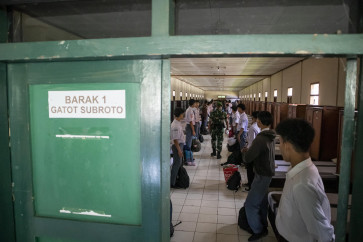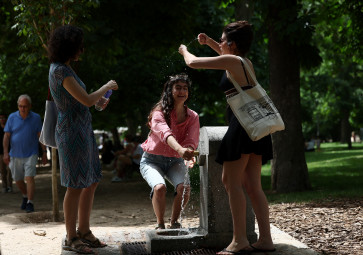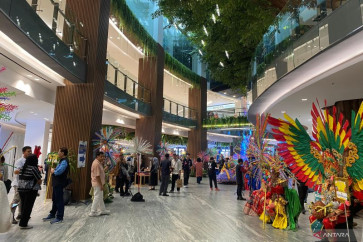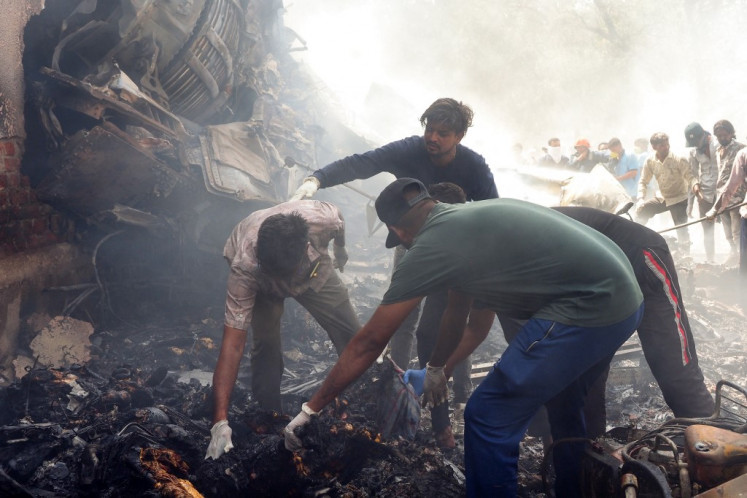The peace dividend in Aceh
To visit Aceh today is to experience something the world rarely sees; the dividends of peace
Change text size
Gift Premium Articles
to Anyone

To visit Aceh today is to experience something the world rarely sees; the dividends of peace.
Five years ago when I last visited the capital Banda Aceh, it was like walking through a war zone. Piles of blackened, stinking debris and the ruins of destroyed buildings were virtually all that was left of the city a month after the devastating tsunami that killed more than 200,000 people across the province.
Ordinary Achenese, already suffering from more than thirty years of low intensity conflict, were broken and dispirited. How would they recover from so much death and devastation?
To find out, just pay a visit to the newly opened Tsunami Museum. The remarkable structure shaped like a basket, has been open barely a year, and crowds of Acehnese still throng its modern, spiraled hallways.
Through paintings, photographs and cleverly designed chambers which convey a terrifying sense of what it was like to face a roaring torrent of black water several stories high, Achenese recall the horror that tragically transformed their lives.
They visit the memorial park that has been designated around the 2,000 ton generator ship that was hurled with all the force of the wave several kilometers from its anchorage onto a small group of houses inland. In another location, the city is designing a small museum around a fishing boat still sitting atop a building, commemorating the 59 lives saved by that ship on the day of the tsunami.
Welcome to the tsunami tourist trail. What is so striking about the different ways the Acehnese are memorializing their tragedy is that at every turn they are reminded of the peace and security that accompanied the recovery and reconstruction effort.
It's hard to recognize downtown Banda Aceh as an Indonesian provincial capital, with its wide unbroken streets, tree lined avenues and orderly roundabouts.
Gaily painted concrete shop houses are sprouting everywhere, and the talk in one local coffee shop was about an expected scarcity of land as Achenese and immigrants from other parts of Indonesia flock to the regional capital, which has experienced a construction boom.
But even if there are growing complaints about the huge amounts of money contributed to reconstruction of the province running out, no one doubts the other major contributing factor to the province's new found security, which is peace.
Many Acehnese still find it unbelievable that just five years ago you could be arrested for not displaying an Indonesian flag in your vehicle, and now the man who sits in the Governor's office and the majority of local government officials are former separatist leaders. "All this is because of peace, not just money," says Iwan Samsuar, a local driver.
The most remarkable aspect of Aceh's transformation is that it remains very much a part of Indonesia. The visitor searches for signs of the particularism and distinctiveness that you might expect from an autonomy arrangement that is unique under Indonesia's unitary state framework.
Yet ahead of Indonesia's National day on Aug. 17, the city is a sea of red and white Indonesian flags, symbols of the President's Democrat party are everywhere, but I only saw one sign for the Partai Aceh, the new incarnation of the Aceh Freedom Movement or GAM.
President Susilo Bambang Yudhoyono, who took the decision shortly after the tsunami struck in December 2004 to re-start the stalled peace process, garnered 90 percent of the vote in the province in last July's Presidential election, a higher percentage than he won anywhere else in the country.
Billboards across the city welcomed him to Aceh on a recent visit to inaugurate a new international airport.
In a province where people once reviled the Javanese who dominate the military and bureaucratic ranks of central authority, a Javanese president is now wildly popular.
The conflict in Aceh may not have been all that intense in a purely military sense, but the decades of enmity between the Acehnese and the apparatus of Indonesian authority, spawned a deeply entrenched independence movement, whose adherents and supporters now find themselves with a considerable measure of control over Aceh's future.
The process of accommodation and integration of the two sides was always going to be the chief risk to the peace process, and this has largely been achieved because of the successful democratic political process implemented since the peace agreement was signed in August 2005.
Few believed that Jakarta would allow the GAM to freely establish their own political party without massive interference from the center; fewer still imagined that the GAM would be satisfied with winning an election without using its victory to press the case for independence. Yet this is a conflict that has always had its roots in the sharing of spoils.
That's why the reconstruction of Aceh so evident today, and the expected returns in terms of revenue and investment are probably the most important dividends of peace. For if the Acehnese sense any betrayal of the economic promise of autonomy, old feelings of enmity and the threat of conflict will surely resurface.
As the Dutch learned after nearly a century of war with the Acehnese, subjugation leaves a legacy of hatred and mistrust. What the government in Jakarta has achieved through the twin policies of reconstruction and autonomy stand out as a beacon of what peace and reconciliation can achieve.
The writer is the Asia Regional Director of the Centre for Humanitarian Dialogue, which mediated the first Cessation of Hostilities Agreement in Aceh in December 2002.









